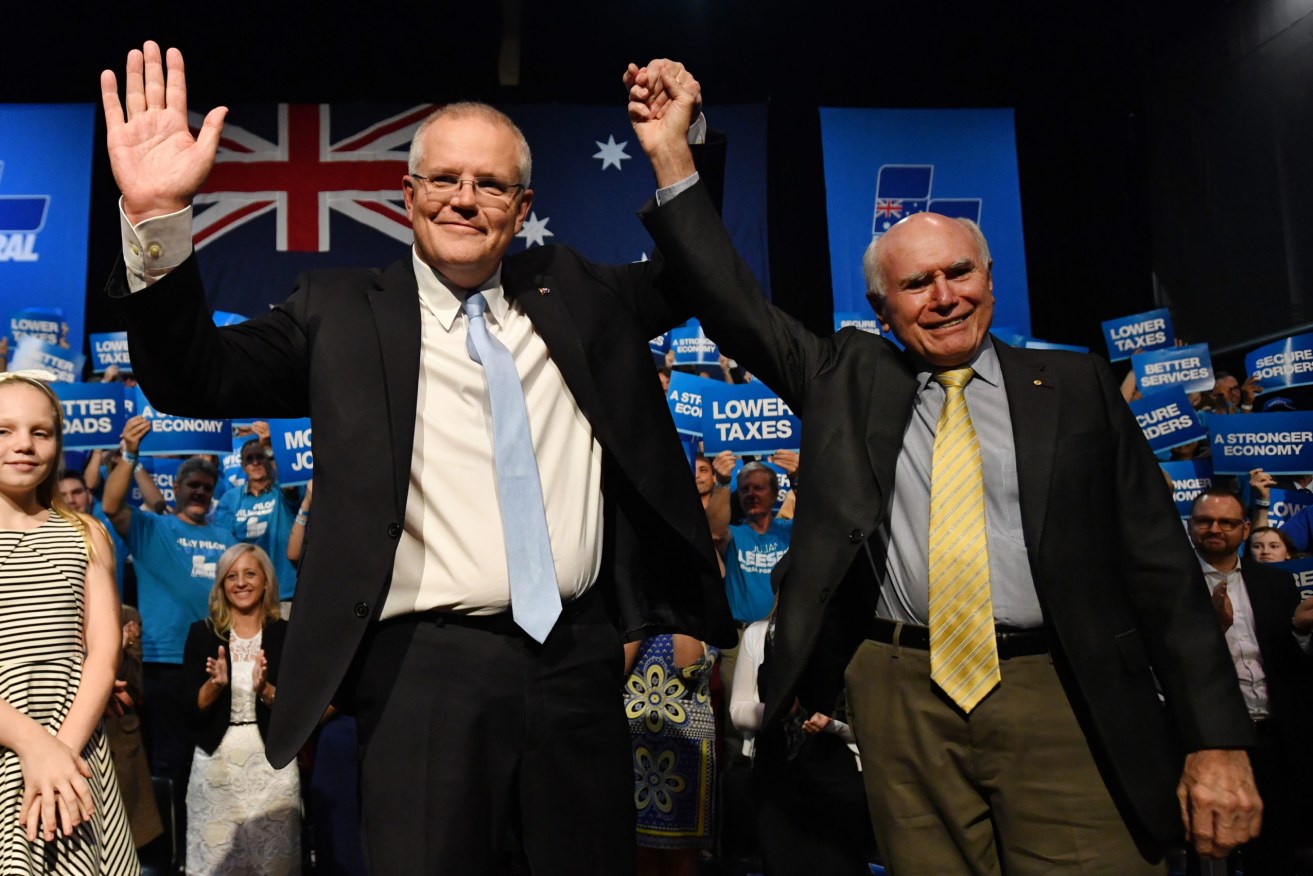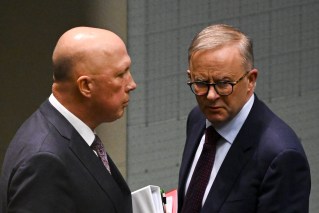Morrison’s anniversary marks unlikely rise from the ashes
On the first anniversary of his “miracle” election win, Scott Morrison enjoys what so few leaders in recent times have been able to boast — political capital.

Prime Minister Scott Morrison, pictured with John Howard after his 2019 election win. (Photo: AAP Image/Mick Tsikas)
It’s quite the turnaround for the Prime Minister, whose credibility got crisply toasted as the bushfires raged and razed through late 2019 and into the New Year.
Perhaps we can all be grateful Morrison had such an awful time of it.
As one of his confidants observed: “It was very bruising and humiliating.”
Some Liberals feared their leader had been permanently damaged by his public ignominy.
Being booed and jeered by constituents on the charred NSW coast would scar any politician, however thick their elephant hide.
But when Morrison forced handshakes on hostile locals, he committed his profession’s mortal sin: failure to read the crowd.
No magic for marketing can easily overcome such visceral human rejection, especially when it’s unhelpfully captured by the dead eye of an HD digital lens.
His ill-timed Hawaiian holiday had invited broader questions about his judgement. Every step taken thereafter was too easily seen as compensatory for the first.
The search for redemption
After those ghastly few weeks, the best Morrison could have hoped for was forgiveness.
So when the coronavirus crisis arrived in Australia in the fourth week of January, it found a humbled PM keen for redemption.
No one will ever know whether that long, hot, nasty summer made him more agreeable to taking counsel, but early on in the crisis Morrison made it clear to colleagues he would be acting in accordance with the medical advice.
Brendan Murphy, who’d become the PM’s unlikely wingman in a series of improbably high-rating press conferences, told the PM in those early days that other nations had faced an awful predicament in tackling coronavirus.
Italian doctors had had to prioritise the young over the elderly patients because medical equipment and supplies were so stretched, Murphy told him.
“Not on my watch,” the PM reportedly told the Chief Medical Officer and Health Minister Greg Hunt.
This was a statement of principle that served to guide Australia’s response thereafter.
The Prime Minister, who during the bushfires told 2GB radio host John Stanley in December from Hawaii, “I don’t hold a hose, mate, and I don’t sit in a control room”, has been very much on the tools during COVID-19.
His stewardship of the crisis, aided by his formation of the National Cabinet, has had its bumps, most notably knocking heads with Dan Andrews and Gladys Berejiklian over the pace of shutdowns and school closures.
His early messaging had its messy moments too but all-in-all, Morrison’s handling has been undeniably effective, with many decisions made on the basis of incomplete or imperfect data.
Capital is most valuable if you spend it
Australia, along with a couple of other nations, is the envy of the world in its curve-beating response to the pandemic. This should be a reason for cautious national pride.
There will be no New York or Italian catastrophe here.
The PM, premiers and chief ministers have seen to that with their swift and coordinated actions. It has been a triumph of public policy, delivered within the clunkiness of a federation.
Voter sentiment indicates there has been a flight to safety by a population glad to be temporarily rid of the bickering, pettiness and partisanship of normal political gruel.
The political stocks of Scott Morrison and premiers have soared as a consequence.
But as any capitalist would tell you, capital is most valuable if you are prepared to spend it, because market forces inevitably erode its comparative worth.
And spend it Morrison must if he is to meet the next challenge: navigating Australia through a COVID-restrained economic reset, starting with weaning six million workers off the JobKeeper wage subsidy.
It will require the Government to be bold and persuasive in an environment that’s going to be less favourable and much more of a contest.
A big moment missed
The COVID-19 crisis has suited Morrison’s preference for central control and the National Cabinet process, which involves leaders of the blue and red teams, has served to keep partisanship in check, relegating the Opposition to the sidelines for much of the past two months.
But Labor leader Anthony Albanese has begun elbowing his way back into the scrum.
If coronavirus is kept under close management, and the economy continues to slowly inch towards a new normal, the focus will quickly shift to what the future of work looks like in an uncertain time.
Those grateful that a health calamity has been avoided might soon enough become resentful about their lot in life.
There are some hard truths to be heard, yet curiously the Government baulked at its first opportunity to air them.
Treasurer Josh Frydenberg’s economic statement last week was strangely anaemic. It could have been a big moment and the first expression of Coalition ambition.
Instead, it will mainly be remembered for a rather spectacular (non-COVID) coughing fit.
Frydenberg offered a laundry list of measures taken and rattled off various bits of awful economic data but gave little clue as to the path ahead.
This may have been the plan all along, but shadow treasurer Jim Chalmers’ assessment of it being a “missed opportunity” was about right.
What comes after ‘harvesting’ mode?
Thanks to the pandemic, Morrison and Frydenberg are the first PM-Treasurer duo in a long time to be liberated of the surplus fetish that has so distorted measures of economic success.
The federal Treasurer who finally does deliver a “back in black” budget may still be in university.












